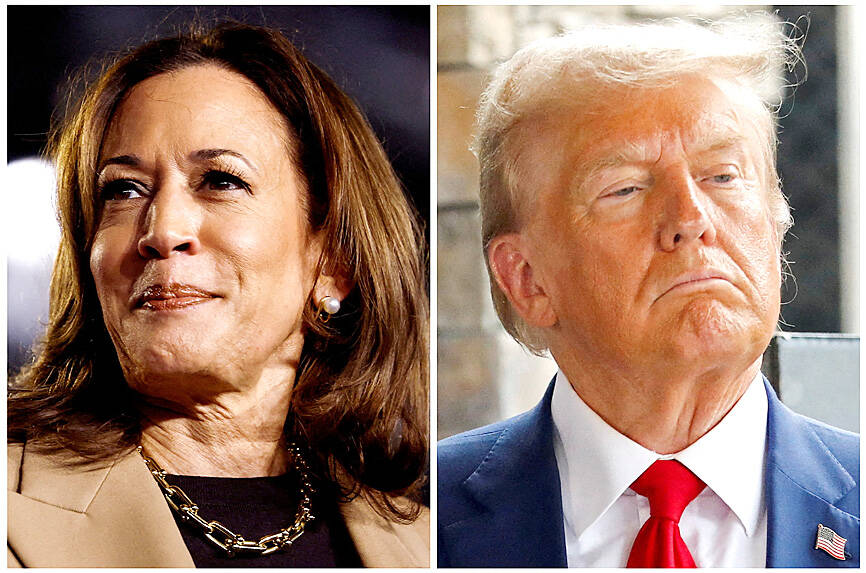Top Taiwanese officials yesterday moved to ease concern about the potential fallout of Donald Trump’s return to the White House, making a case that the technology restrictions promised by the former US president against China would outweigh the risks to the island.
The prospect of Trump’s victory in this week’s election is a worry for Taipei given the Republican nominee in the past cast doubt over the US commitment to defend it from Beijing. But other policies championed by Trump toward China hold some appeal for Taiwan.
National Development Council Minister Paul Liu (劉鏡清) described the proposed technology curbs as potentially having “more pros than cons” for Taiwan. Such restrictions are likely to prompt more Taiwanese companies to shift production back from China and redirect export orders to local manufacturers, he said.

Photo: Reuters
When asked by a lawmaker yesterday about Taiwan’s preparations for the US election results, Liu said that while the island might also face a 10 percent tariff on its goods, “the impact would be limited, as most suppliers in Taiwan are primarily doing contract manufacturing serving the US clients.”
A Trump victory could make a bigger difference for Taiwan than a win by US Vice President Kamala Harris, according to Liu, though he said Taiwan is prepared for various outcomes.
Responding to lawmaker questioning, Minister of Economic Affairs J.W. Kuo (郭智輝) said he expected Harris would likely continue the Democratic Party’s policies on Taiwan.
Kuo acknowledged that Trump could introduce measures that might prove harmful for Taiwan’s semiconductor industry. But Taiwan “will have strategies in place to respond, and the impact will not be as severe as some anticipate,” he said.
China claims the self-governing democracy is its territory, and has threatened to seize the island by force if needed. US President Joe Biden has repeatedly vowed to defend Taiwan in the event of an “unprecedented attack.”
In an interview with CBS News’s “60 Minutes,” Harris hewed closer to the traditional US policy of “strategic ambiguity” while saying it’s important to help Taiwan defend itself.
Trump has been less supportive, telling Bloomberg Businessweek earlier this year that Taiwan stole the US’s chip business. He also called for the island to pay more for defense and noted the challenges of defending it from Beijing. “Taiwan is 9,500 miles away,” Trump said. “It’s 68 miles away from China.”
In a subsequent interview with Bloomberg editor-in-chief John Micklethwait last month, Trump didn’t answer directly when asked if American troops would defend Taiwan if China invaded.

SEMICONDUCTORS: The German laser and plasma generator company will expand its local services as its specialized offerings support Taiwan’s semiconductor industries Trumpf SE + Co KG, a global leader in supplying laser technology and plasma generators used in chip production, is expanding its investments in Taiwan in an effort to deeply integrate into the global semiconductor supply chain in the pursuit of growth. The company, headquartered in Ditzingen, Germany, has invested significantly in a newly inaugurated regional technical center for plasma generators in Taoyuan, its latest expansion in Taiwan after being engaged in various industries for more than 25 years. The center, the first of its kind Trumpf built outside Germany, aims to serve customers from Taiwan, Japan, Southeast Asia and South Korea,

Gasoline and diesel prices at domestic fuel stations are to fall NT$0.2 per liter this week, down for a second consecutive week, CPC Corp, Taiwan (台灣中油) and Formosa Petrochemical Corp (台塑石化) announced yesterday. Effective today, gasoline prices at CPC and Formosa stations are to drop to NT$26.4, NT$27.9 and NT$29.9 per liter for 92, 95 and 98-octane unleaded gasoline respectively, the companies said in separate statements. The price of premium diesel is to fall to NT$24.8 per liter at CPC stations and NT$24.6 at Formosa pumps, they said. The price adjustments came even as international crude oil prices rose last week, as traders

POWERING UP: PSUs for AI servers made up about 50% of Delta’s total server PSU revenue during the first three quarters of last year, the company said Power supply and electronic components maker Delta Electronics Inc (台達電) reported record-high revenue of NT$161.61 billion (US$5.11 billion) for last quarter and said it remains positive about this quarter. Last quarter’s figure was up 7.6 percent from the previous quarter and 41.51 percent higher than a year earlier, and largely in line with Yuanta Securities Investment Consulting Co’s (元大投顧) forecast of NT$160 billion. Delta’s annual revenue last year rose 31.76 percent year-on-year to NT$554.89 billion, also a record high for the company. Its strong performance reflected continued demand for high-performance power solutions and advanced liquid-cooling products used in artificial intelligence (AI) data centers,

SIZE MATTERS: TSMC started phasing out 8-inch wafer production last year, while Samsung is more aggressively retiring 8-inch capacity, TrendForce said Chipmakers are expected to raise prices of 8-inch wafers by up to 20 percent this year on concern over supply constraints as major contract chipmakers Taiwan Semiconductor Manufacturing Co (TSMC, 台積電) and Samsung Electronics Co gradually retire less advanced wafer capacity, TrendForce Corp (集邦科技) said yesterday. It is the first significant across-the-board price hike since a global semiconductor correction in 2023, the Taipei-based market researcher said in a report. Global 8-inch wafer capacity slid 0.3 percent year-on-year last year, although 8-inch wafer prices still hovered at relatively stable levels throughout the year, TrendForce said. The downward trend is expected to continue this year,